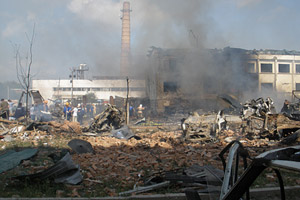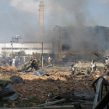
More Russian Troops Headed to Ingushetia
Publication: Eurasia Daily Monitor Volume: 6 Issue: 162
By:

According to independent sources, several additional Russian army units are headed to the special-operations zone where the insurgency in Ingushetia has mounted relentless strikes (www.ingushetia.ru, August 14). As these troops arrive in the area with five Grad missile launchers and several armored personnel carriers, it is clear that significant military action in the region is being prepared. In May, the leaders of Chechnya and Ingushetia agreed to conduct a joint military operation near the border that separates these two North Caucasus enclaves (in Sunzhensky district of Ingushetia and Achkhoi-Martanovsky district of Chechnya.)
On August 13 (Black Thursday) in the North Caucasus a total of eight policemen were killed and 16 wounded in Chechnya, Ingushetia and Dagestan. Civilian losses included eight dead and two wounded; five more, thought to be militants, were also reported dead (Ekho Moskvy, ITAR TASS, RIA Novosti, www.kavkaz-uzel.ru, August 14). These figures clearly indicate escalating tensions in the region in stark contrast with official government propaganda, calling for more investment into this hyper-militarized region in southern Russia.
The August 12 assassination of Ingushetia’s Construction Minister Ruslan Amerkhanov in his office in Magas (www.ingushetia.org, August 12) has not been blamed on the rebels, due to Ingushetia’s many other conflicts fueled by crime and redistribution of power after the election of President Yunus-Bek Yevkurov. Yet, his murder is still a telling indication of Ingushetia’s harsh reality, where every day brings fresh reports of new incidents. After the minister’s slaying President Yevkurov returned to work ahead of schedule (Russian Presidential Decree, www.document.kremlin.ru, August 12). It is envisaged that his term will begin with a two-week document review, after which Yevkurov will reclaim his office in Magas.
Meanwhile, one resident of Voznesenskaya village, Gulnara Badirova, was killed on August 13 (www.regnum.ru, August 13). According to locals, the victim was known as a fortune-teller, which the militants considered as a capital offense – this was not the first incident involving a fortune-teller being hunted down by the rebels in Ingushetia. During that same week, gunfire opened on the house of the Yevkurov family in Kantyshevo village – the president’s relatives who are active in the liquor business (www.ingushetia.org, August 14). People in this line of work are also regularly targeted by the militants, who call for an end to these anti-Islamic practices. On the evening of Black Thursday, unidentified attackers dressed in battle fatigues assaulted a brother and sister (www.ingushetia.org, August 13).
In the neighboring republic of Chechnya, which according to President Ramzan Kadyrov is "the most peaceful region in Russia," the news of these high-profile incidents appear a lot more often than the government would like. After the notorious murders of human rights activists Zarema (Rayana) Sadullaeva and her husband Alik (Umar) Jabrailov, the public was once again forced to speculate on the government’s possible involvement in these assassinations. In Chechnya, where anyone who happens to publicly disagree with or disapprove of Ramzan Kadyrov’s policies is considered an enemy and an insurgent (www.ingushetia.org, August 14), it takes very little effort to find someone to kill a human rights activist in the name of the president. The government’s attempts to portray the murders as blood vendettas are groundless, simply because Chechen traditions dictate that women are never targeted for revenge regardless of the circumstances. Commenting on the murders of Natasha Estemirova and Zarema Sadullaeva, the head of the investigative committee in the state attorney’s office Alexander Bystrikin said that no one wants to cooperate with the investigation out of fear (www.regnum.ru 14): for the Chechen people, there are many good reasons to be afraid.
The most likely explanation is that organizations receiving grants from foreign donors are being expelled from the republic with the ultimate goal of clamping down on the negative news that both the local and the federal governments are trying to hide. The exodus of human rights organizations from Chechnya, combined with the ongoing ban on the unrestricted travel of independent journalists without police or FSB escorts, will further consolidate Chechnya’s isolation from the real picture of this perpetual North Caucasus hotspot.
Repression tactics used by the Chechen government fuel the silent but widespread anger over these illegal acts. In its attempts to break the insurgency, the government humiliates parents of known militants by pushing them into televised appearances, desecrates corpses, insults grieving families, bans internment and proper burials of the killed rebels, and puts physical and emotional pressure on families, friends and relatives of those who join the insurgency. Independent human rights organizations in Chechnya have been documenting these and other tactics on a regular basis (www.kavkaz-uzel.ru, August 14). Unfortunately, these methods are no longer an exception; they are clearly a manifestation of well-organized and planned government policies tacitly encouraged by Moscow.
In response to German Chancellor Angela Merkel’s remarks about the disturbing events in the North Caucasus, Russian president Dmitry Medvedev said that murders of the human rights defenders in Chechnya should be blamed on groups funded by foreign sources. As Medvedev said in his interview with Ekho Moskvy radio station on August 14, those allegedly providing funding are unhappy with Russia’s development. Not surprisingly, the local governments echoed his remarks in their own propaganda. However, the deputy chairman of the international commission against international crime, terrorism and corruption Yury Tscherbakov offered a different explanation: "The roots of the armed clashes in the North Caucasus were planted several centuries ago," he said, adding that "the government has learned no lessons after the Caucasus War of the nineteenth century or after the more recent conflicts" (www.nr2.ru, August 14).




